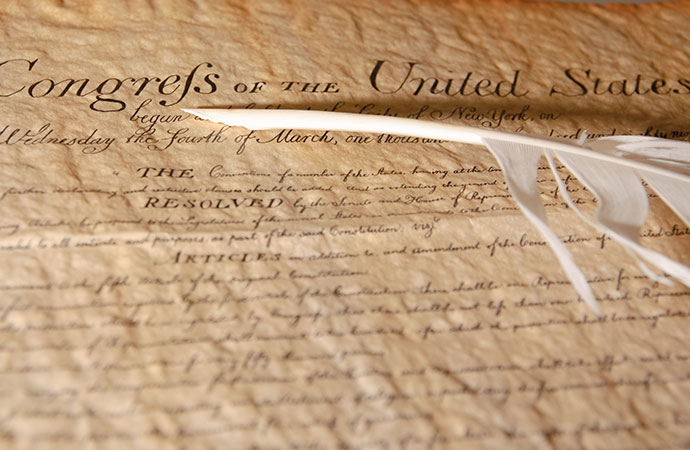An earlier version of this article first appeared in Townhall.com.
When we celebrate leading American founders such as George Washington and James Madison, we sometimes overlook their talented colleagues.
One of these was Ebenezer Hazard. As postmaster general under the Articles of Confederation, he helped bind the country together. As a historical editor, he preserved precious documents for an entire gene ration of American historians.
ration of American historians.
Hazard, born in 1744, was a year younger than Thomas Jefferson and seven years older than Madison. New parents nowadays avoid the biblical name “Ebenezer”—possibly because of its association with Charles Dickens’ Ebenezer Scrooge—but the name was more common then. (It means “stone of help.”)
Like Madison, Hazard was educated at what is now Princeton University. Unlike Madison, Hazard moved to New York City and entered business after graduation. He first worked for a mercantile firm, then for a bookseller. In 1770, he became a partner in a book selling company and soon began collecting historical documents. He conceived the idea of a massive republishing project to ensure that ancient materials were not permanently lost or destroyed.
Hazard spoke with many people about his document publication plan, including other founders, such as Jefferson and John Adams. Both were impressed: “Hazard is certainly very capable of the business he has undertaken,” Adams wrote. “He is a genius.”
For the moment, however, Hazard’s publication project was overtaken by the Revolution. In 1775, Americans stopped patronizing the British royal postal service, creating their own instead. Hazard became postmaster for New York and another founder, Ben Franklin, was named postmaster general for the continent. Franklin subsequently appointed Hazard “surveyor” (inspector) for the continental post office.
In 1776, Franklin’s son-in-law, Richard Bache, succeeded Franklin as postmaster general. Bache served until his retirement in 1782.
Bache may have not been quite up to the job, but Hazard, who followed Bache as postmaster, overcame constant political interference from the Confederation Congress and made the system work. By 1785, it was earning a profit. Hazard thereby provided Congress, which had no taxing power, with desperately needed revenue. Hazard also left valuable journals of his travels throughout the country, which he undertook while on his postal inspection tours.
In 1783 and again in 1788, congressional committees investigating postal operations gave Hazard’s administration very high marks.
Nevertheless, Hazard, like many other competent administrators before and since, was gored by the horns of politics. He became dissatisfied with the quality of service between New York and Boston. He recommended to Congress a plan, which Congress then authorized, to replace stage coaches with post riders on that New York-to-Boston route.
The transition was not smooth, and there were substantial service interruptions. More seriously, Hazard offended increasingly powerful newspaper owners who had taken advantage of the coaches, which had provided the owners with free and low-cost newspaper delivery. With less room in their mail bags, post riders could not offer newspapers that perk.
The timing of the delivery snafu could not have been worse. It occurred at the height of the debates over the Constitution, when Americans eagerly sought news from other parts of the country. Opponents of the Constitution accused Hazard of blocking their newspapers and their mail in a nefarious plan to secure ratification. Some of the Constitution’s supporters thought Hazard was obstructing communications as part of an evil plan to defeat ratification.
George Washington was among those upset. Upon being elected president, he refused to allow Hazard to continue as postmaster general. In fact, Washington failed to notify Hazard he was being replaced or even to respond to his letters. Hazard learned in the streets that he had lost his job.
Finding a new position proved a struggle, and Hazard was forced to move from New York to Philadelphia. There, he entered the insurance business and helped found the Insurance Company of North America. He also returned to his plan of copying and republishing historical documents.
During the 1790s, after Herculean exertion, Hazard published two volumes of his Historical Collections. Each volume contained more than 600 pages of charters and other documents. They covered the period from the voyages of Columbus to the year 1664.
Relying on his knowledge of book publishing and of ancient Greek, during the first decade of the 1800s Hazard provided critical editorial assistance to Charles Thomson, the secretary of the former Continental and Confederation Congresses, in Thomson’s translation of the Septuagint. This was the first translation into English of the earliest extant version of the Bible.
The efforts of this learned, religious, and diligent man proved invaluable to an entire generation of American scholars. Today, Ebenezer Hazard is acknowledged as America’s first historical editor. We also should acknowledge him as an important American founder.







